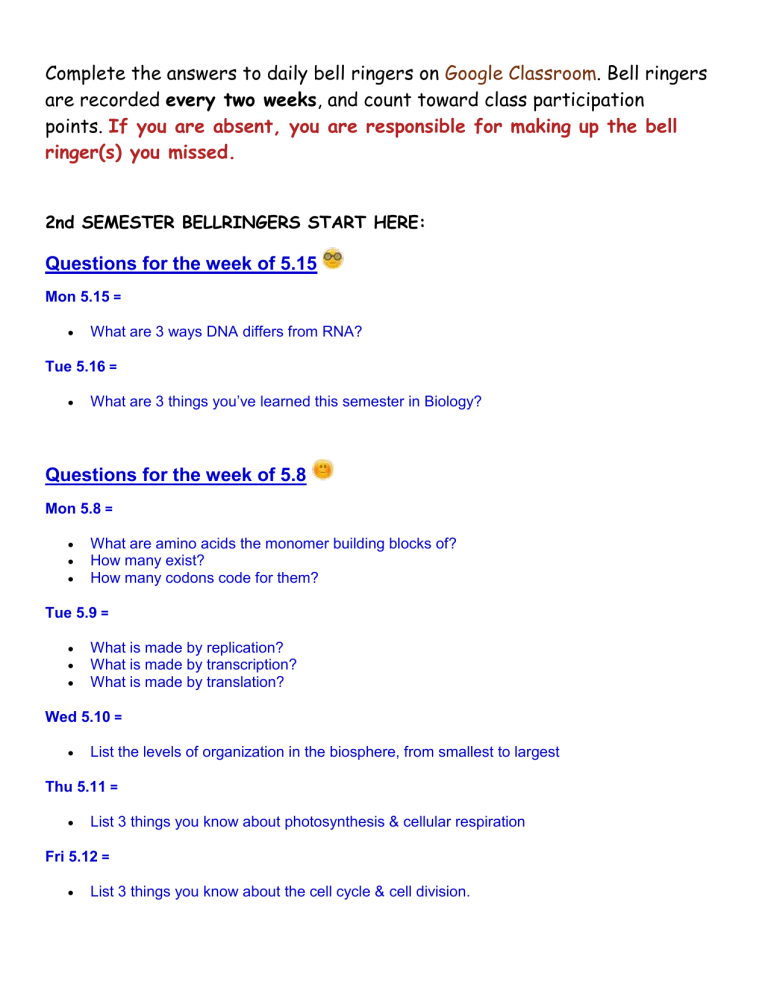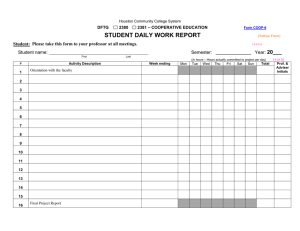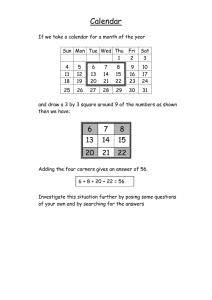
Complete the answers to daily bell ringers on Google Classroom. Bell ringers are recorded every two weeks, and count toward class participation points. If you are absent, you are responsible for making up the bell ringer(s) you missed. 2nd SEMESTER BELLRINGERS START HERE: Questions for the week of 5.15 Mon 5.15 = What are 3 ways DNA differs from RNA? Tue 5.16 = What are 3 things you’ve learned this semester in Biology? Questions for the week of 5.8 Mon 5.8 = What are amino acids the monomer building blocks of? How many exist? How many codons code for them? Tue 5.9 = What is made by replication? What is made by transcription? What is made by translation? Wed 5.10 = List the levels of organization in the biosphere, from smallest to largest Thu 5.11 = List 3 things you know about photosynthesis & cellular respiration Fri 5.12 = List 3 things you know about the cell cycle & cell division. Questions for the week of 5.1 Mon 5.1 = Name the 3 types of RNA and the purpose for each Tue 5.2 = List three ways that RNA differs from DNA. Wed 5.3 = What does DNA stand for? List 3 characteristics of DNA. Thu 5.4 = Compare & contrast replication and transcription Fri 5.5 = What is a codon? Which RNA copies them Why? Questions for the week of 4.24 Mon 4.24 = Which nitrogen bases are purines? Which are pyrimidines? How are they different physically? Tue 4.25 = What are the ideas about the structure of DNA that came from Rosalind Franklin’s work? Wed 4.26 = List two ways that chromosomes in prokaryotes differ from those in eukaryotes. Thu 4.27 = Why is replication needed? When does it specifically occur? Fri 4.28 = Name the 3 types of RNA and the purpose for each Questions for the week of 4.17 Mon 4.17 = List the 4 parts of the cell cycle, and the 5 parts of cell division. Tue 4.18 = Use these terms correctly in sentences: cell cycle, interphase, mitosis Wed 4.19 = List three things that happen to cells during cell division. Thu 4.20 = In your own terms, what is cancer? How does it relate to cell division? Fri 4.21 = What are cyclins? What are the two categories and what does each do? Questions for the week of 4.10 Tue 4.11 = What part of the cell divides during mitosis? What are the stages of mitosis? Wed 4.12 = What part of the cell divides during cytokinesis? When does it take place? Thu 4.13 = List the main events of prophase. Fri 4.14 = How does cytokinesis happen differently in plant & animal cells? Why is there a difference? Questions for the week of 4.3 Mon 4.3 = What is a chromosome made of? When does it look like a chromosome? What form does it take the rest of the time? Tue 4.4 = List the 4 stages of the cell cycle & tell the main event of each. Wed 4.5 = Compare & contrast chromatin and chromosomes. Thu 4.6 = Contrast Gap 1, Synthesis, & Gap 2. Questions for the week of 3.27 Mon 3.27 = What is cellular respiration? Which organisms use it? Tue 3.28 = List the 3 stages of cellular respiration. Which does not occur within mitochondria? Wed 3.29 = Why do cells need to divide? What process(es) do they use to divide? Thu 3.30 = What is mitosis? Why is it needed? Fri 3.31 = Contrast mitosis & cytokinesis Questions for the week of 3.20 Mon 3.20 = What organelle is responsible for most of cellular respiration? What energy molecule is it releasing? Tue 3.21 = What are the three processes of cellular respiration, and where does each take place? Wed 3.22 = What are the products of cellular respiration? What happens to them? Thu 3.23 = What are the waste byproducts created by cellular respiration? During which step is each produced? Fri 3.24 = What are 2 ways photosynthesis and cellular respiration differ, and one way they are similar? Questions for the week of 3.6 Mon 3.6 = What are the reactants of cellular respiration? Where did these come from? Tue 3.7 = What does food do for heterotrophs? How are calories related to food? Wed 3.8 = What is a calorimeter? How did we make the calorimeters used in our lab? Thu 3.9 = Contrast aerobic & anaerobic. Which applies to fermentation? Questions for the week of 2.27 Mon 2.27 = List 3 facts about photosynthesis. Tue 2.28 = What organisms use photosynthesis? What organelle is responsible? Wed 3.1 = Define “heterotroph.” Which organisms are considered heterotrophs? Thu 3.2 = Define “calorie” (with a lowercase “c”). What term means “1000 calories?” Fri 3.3 = What organelle is responsible for cellular respiration? What part of it takes place in the cytoplasm instead? Questions for the week of 2.20 Tue 2.21 = List three factors that affect how/when photosynthesis happens. Wed 2.22 = Which category of organisms carry out photosynthesis? Which specific organisms are included? Thu 2.23 = Name the two parts of photosynthesis, and the area of the chloroplast each takes place in. Fri 2.24 = What are the reactants of photosynthesis? What are the products of it? Questions for the week of 2.13 Mon 2.13 = What do ATP & NADPH2 both provide? Where do they take that? What does each change into? Tue 2.14 = List the reactants & products of the light independent reactions? In what part of the chloroplast do those reactions take place? Wed 2.15 = Contrast grana and stroma. Include what each is & what happens in each area. Questions for the week of 2.6 Mon 2.6 = What does “ATP” stand for? What are its “ingredients?” Tue 2.7 = What are the organelles where photosynthesis occurs? What pigment do they contain? Wed 2.8 = What are the two main parts of photosynthesis? In what part of the chloroplast does each occur? Thu 2.9 = Compare & contrast light-dependent and light-independent reactions. Fri 2.10 = Why does light provide for photosynthesis? What attracts light into a plant? Questions for the week of 1.30 Mon 1.30 = List the levels of organization of the biosphere from the simplest to the most complex. Tue 1.31 = What is ecology? Why is it important to understand? Wed 2.1 = Contrast predation and herbivory. What are they both examples of? Thu 2.2 = Why do organisms need energy? What can different organisms do to get energy? Fri 2.3 = What reactants go into the photosynthesis process? What products are created? Questions for the week of 1.23 Mon 1.23 = Contrast emigration and immigration. Include how each affects the population Tue 1.24 = What is exponential growth? Can it continue long? Explain. Wed 1.25 = List the 3 phases of logistic growth in a population. Thu 1.26 = Use the terms population, geographic range & population density correctly in sentences. Fri 1.27 = What is demography? Name 3 characteristics it might study. Questions for the week of 1.16 Tue 1.17 = What is another term for a consumer? List the six subtypes of consumers. Wed 1.18 = What is a nutrient? Name the 3 nutrient cycles we discussed. Thu 1.19 = What is a population? What are some things that might affect the size of a population? Fri 1.20 = How does population density differ from population distribution? Questions for the week of 1.9 Mon 1.9 = Compare & contrast producers and consumers, including examples for each. Tue 1.10 = Compare & contrast herbivores & carnivores, including examples for each. Wed 1.11 = How does a food web differ from a food chain? Thu 1.12 = What does an energy ecological pyramid show? How much energy passes from one level to the next? Fri 1.13 = Use these terms correctly in sentences: organism, ecosystem, consumer, food web Questions for the week of 1.2 Tue 1.3 = Define biosphere. Why is it appropriate to study the biosphere in Biology? Wed 1.4 = Define species. How is it different from a population? Thu 1.5 = Compare and contrast ecosystem & community, including examples for each. Fri 1.6 = Compare & contrast biotic factors and abiotic factors, including examples for each. FIND 1st SEMESTER BELLRINGERS HERE: Questions for the week of 12.12 Mon 12.12 = Define cell, biology & organism. Tue 12.13 = What is the benefit of using microscopes? What are the types of microscopes we used in class? Wed 12.14 = Compare and contrast monomers & macromolecules Thu 12.15 = List 3 biology concepts you know now that you didn’t know in August. Questions for the week of 12.5 Mon 12.5 = What is a catalyst? What is the benefit of enzymes working as catalysts? Tue 12.6 = How do enzymes relate to chemical reactions? What happens if they’re not present? Wed 12.7= What material in our lab acts as the catalyst in the reactions? What are the reactants? Thu 12.8 = Compare and contrast products & reactants. Fri 12.9 = What are 2 things in your body that can affect how well an enzyme is able to work? Which was the topic of our lab? Questions for the week of 11.28 Mon 11.28 = Use the following terms correctly in sentences: o Monomer, macromolecule, compound, bond Tue 11.29 = List the 4 main carbon macromolecules, and the elements that belong to each. Wed 11.30= List the 4 main macromolecules & 1 job for each. Thu 12.1 = What is a chemical reaction? Why are they needed in a body? Fri 12.2 = What type of macromolecule are enzymes? What is their purpose? Questions for the week of 11.21 Mon 11.21 = Compare & contrast nucleotides and amino acids Tue 11.22 = List 3 things you know about macromolecules you didn’t know a month ago. Questions for the week of 11.14 Mon 11.14 = What are the monomer building blocks of complex carbs? Of fats & oils? Of nucleic acids? Tue 11.15 = What are the monomer building blocks of proteins? What are the parts of that monomer? Wed 11.16 = In what kinds of foods would you find carbohydrates? Lipids? Proteins? Thu 11.17 = What is an indicator? Name the chemical indicators used in our lab. Fri 11.18 = List 3 jobs that proteins do for an organism. Questions for the week of 11.7 Mon 11.7 = What are the monomer building blocks of fats & oils? How are waxes & sterols different? Tue 11.8 = What are three differences between carbohydrates and lipids? Wed 11.9 = What is a monomer? What is a macromolecule? How are they related? Thu 11.10 = What are the monomer building blocks of nucleic acids? What are the parts of that monomer? Fri 11.11 = What are three differences between DNA & RNA? (specify what belongs to what) Questions for the week of 10.31 Mon 10.31 = List three characteristics of water. Tue 11.1 = What is an element? How is it different from a compound? Wed 11.2 = List the four main organic biomolecules and give an example for each. Thu 11.3 = List the three categories of carbohydrates & name one example for each. Fri 11.4 = How is it possible different compounds be made from the same elements? Questions for the week of 10.24 Tue 10.25 = What elements make up water? Is water a mixture or a compound? Explain. Wed 10.26 = What characteristic of a water molecule allows it to show adhesion & cohesion? What’s the difference between those properties? Thu 10.27 = What is a mixture? How is a mixture different from a compound? Fri 10.28 = Compare & contrast adhesion and cohesion Questions for the week of 10.17 Mon 10.17 = Compare & contrast magnification and resolution Tue 10.18 = What are two benefits of using the SI/metric system? Wed 10.19 = Define atom, molecule & compound Questions for the week of 10.10 Mon 10.10 = List the parts of a compound microscope’s optical system & tell the job for each. Tue 10.11 = List the parts of the illuminating system and tell what each does. Wed 10.12 = Generally, what are adjustments used for? How is the coarse adjustment different from the fine adjustment? Thu 10.13 = List 3 of the mechanical system parts, & tell the job of each. Fri 10.14 = Which microscope did you enjoy using most in last week’s lab? Why? Questions for the week of 10.3 Mon 10.3 = What is a derived unit? Name two examples. Tue 10.4 = What does it mean to magnify something? Why might magnification be needed in science? Wed 10.5 = Compare & contrast light microscopes and electron microscopes. Thu 10.6 = What types of things are easier to see with a hand lens? A compound microscope? Fri 10.7 = What types of specimens are best viewed with a dissecting microscope? Why wouldn’t you use a compound microscope with those? Questions for the week of 9.26 Mon 9.26 = Why is it important to be accurate in taking measurements? What system helps scientists to be accurate? Tue 9.27 = What are the base metric units for length, mass, time & temperature? Wed 9.28 = What does a prefix do for a metric measurement? What is the smallest prefix we use? What is the largest prefix we use? Thu 9.29 = What amount is the metric/SI system based on? List two advantages to using the metric system when measuring. Fri 9.30 = What SI prefixes are worth: o 100, 10, 0.01, 0.000001 Questions for the week of 9.19 Mon 9.19 = What is homeostasis? What happens if an organism can’t maintain it? Tue 9.20 = Can nonliving things show any characteristics of life? Explain. Wed 9.21 = Explain the characteristic “as groups, living things adapt & evolve.” Thu 9.22 = In the “It’s Alive…” lab, what characteristic of life was hardest to judge? Why? Fri 9.23 = What is biology? What is an organism? Questions for the week of 9.12 Mon 9.12 = What are three things that make something living different from something nonliving? Tue 9.13 = List & describe 3 characteristics living things have in common. Wed 9.14 = Why are things like virus, seeds, or eggs difficult to fully classify as living or nonliving? Thu 9.15 = List 3 signs you’d look for to tell if the object you’re holding is alive or not/ Fri 9.16 = What is a cell? How many are needed to be considered living? Questions for the week of 9.5 Tue 9.6 = What is the difference between a hypothesis, a conclusion, & a theory? Wed 9.7 = What is the difference between a data table & a graph? When is each used? Thu 9.8 = List the main types of graphs, and what data each is best used to display. Fri 9.9 = In your own terms, define biology & organism. Questions for the week of 8.29 Mon 8.29 = What is a hypothesis? How does a hypothesis relate to an experiment? Tue 8.30 = What does science help us do? What are its limitations? Wed 8.31 = Define science. How is it different from science fiction or pseudoscience? Thu 9.1 = Define data. Why is data important in scientific investigations? Fri 9.2 = Contrast the independent & dependent variables. Questions for the week of 8.22 Tue 8.23 = What is biology? List one contribution biology has made to humanity. What are you looking forward to / fearing in biology this year? Wed 8.24 = Why is it important to have labs in a science class? Why is safety in the lab important? Thu 8.25 = What are 3 things you need to do when planning & conducting an experiment? Fri 8.26 = Tell 3 lab safety rules.



